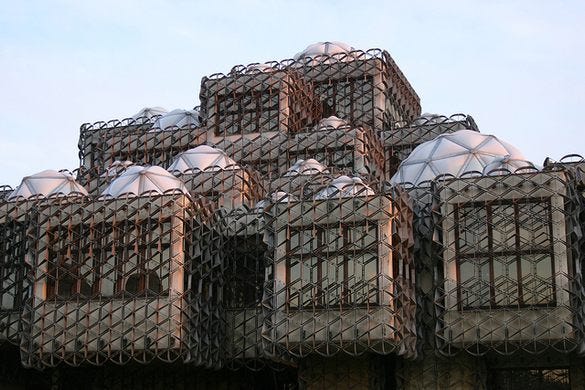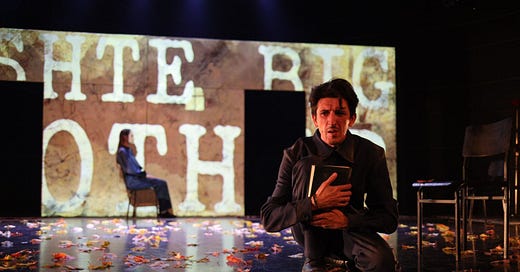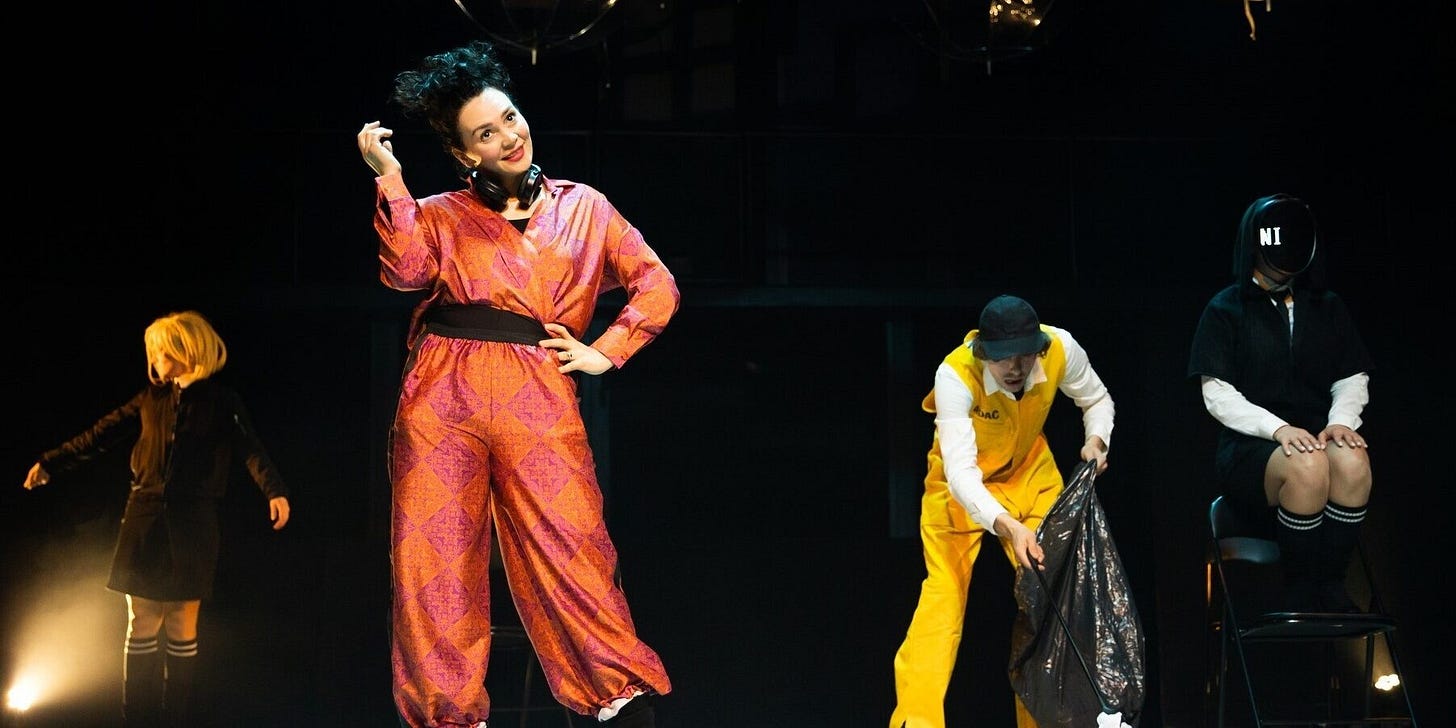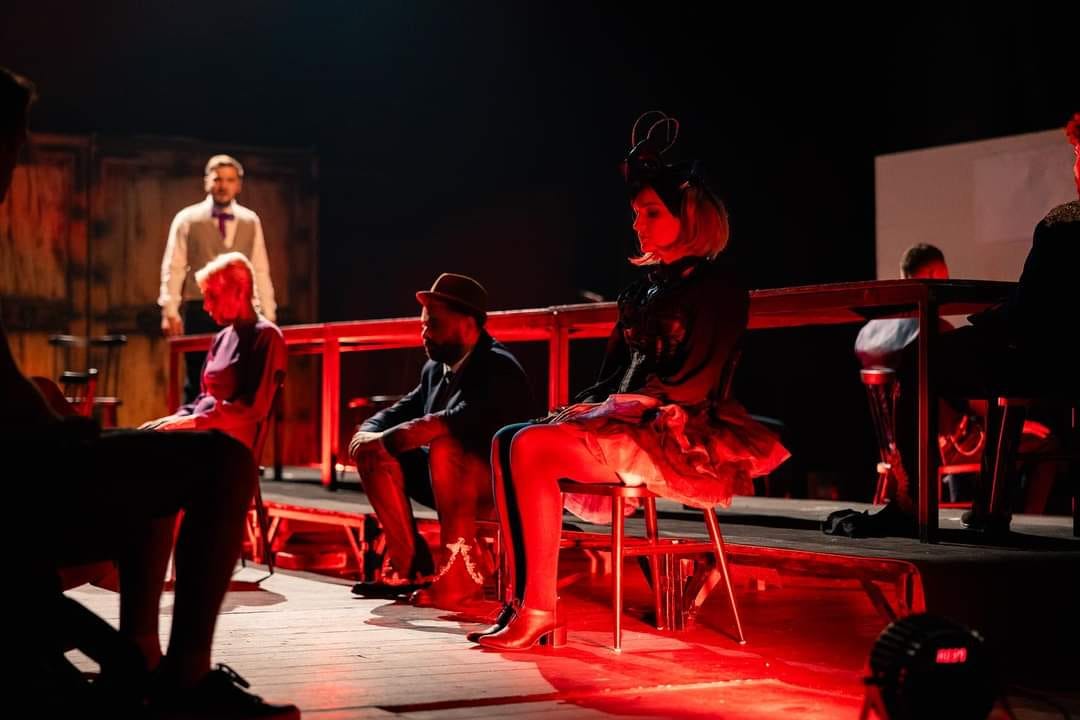Burgers, burek and wearable tech: the evolution of the Kosovo Theatre Showcase
On a packed five-day programme of theatre (and raki) in Kosovo.
Welcome to Café Europa, a weekly newsletter dedicated to European theatre.
This week we’re staying in Kosovo, for the annual theatre showcase, which took place in conjunction with the IETM Caravan between 24th-29th October. I was there in my capacity as a workshop facilitator for aspiring critics in the region, though I also managed to find time to write about a new play about the Enfield Poltergeist for BBC Culture.
I also wrote about international touring for The Stage and the particular challenges faced by organisations in the UK when trying to bring international work to the country. The article uses Miet Warlop’s One Song, which recently played Transform festival in Leeds and Battersea Arts Centre in London, as a case study to explore wider questions about programming and cultural perceptions.
If you enjoy reading this newsletter, then please consider sharing it with friends or colleagues or, you know, anyone who might find it useful. Please also consider becoming a paid supporter, as it really makes a difference and will allow me to expand my coverage. As is the way these days, I also have a Ko-fi account, if you want to keep me caffeinated during all the many bus journeys I’ve taken of late. I want to keep as much of the content free as possible, so all donations are very welcome.
Birth of a national showcase
The first Kosovo Theatre Showcase took place in 2018, a decade after Kosovo declared independence. The initial idea was to present the work of Qendra Multimedia, the production company run by playwright Jeton Neziraj, to an invited group of international guests. However, he soon realised it made more sense both from a practical and cultural perspective to create a Kosovo Theatre Showcase. “Even though extremely isolated and with limited financial and infrastructural opportunities, the Kosovo theatre scene has extraordinary potential,” he says. “The theatre showcase aims to promote this theatre scene internationally, but also empower and make connections between its actors locally.”
I attended that first showcase, having received an invitation from Neziraj. Did I want to come and see some Kosovo theatre? Yes, I did, but as a Brit with a familial link to Serbia and someone with a proclaimed interest in theatre of the ex-Yugoslav region, this invitation brought home to me how embarrassingly little I knew about Kosovo, its art, its history, its people. So, it was with a mix of professional and a deeper personal curiosity – a sense that my understanding of where my family came from was incomplete – that I accepted.
When I told my family I was going to Prishtina, they were apprehensive. One of my otherwise very level-headed aunts warned me not to go out alone at night and under absolutely no circumstances whatsoever to let on that I was Serbian. I dismissed most of this, but I’d be lying if I said I hadn’t on some level, absorbed some of these negative perceptions. This stuff seeps into you.
Any concerns I may have had evaporated the first evening as I was warmly welcomed by Neziraj and his colleagues. Since then, I've returned many times and made firm friends. I profiled Neziraj for the Guardian in 2019. For complicated reasons I even found myself living in the city for a bit in 2020, during which time Qendra admirably/foolhardily (delete as you see fit) staged a scaled-down showcase during a brief relaxation in pandemic restrictions. Over the past few years I have held workshops for aspiring critics in the region during the showcase along with German critic Tom Mustroph, which I guess means I am better placed than many to appreciate how the showcase has evolved.
“We can absolutely see the results of the showcase,” says Neziraj. “Articles and reviews have been written by prestigious international media, many invitations by various European theatre festivals have been received and important theatre contacts and collaborations have been conceived. And even though this might seem very little at first, it is in fact a lot for an isolated and financially poor theatre scene.”




The streets of Prishtina
Autumn has crimsoned the trees in the centre of Prishtina, Kosovo’s rapidly expanding capital city. The pedestrianised Mother Teresa Boulevard which runs through the centre of the city, is abuzz. People drink macchiatos at the cafes which line the street (the standard of coffee in Kosovo is uniformly excellent). Street stalls sell popcorn and chestnuts. (Mostly) docile street dogs doze in the sun beside the statue of Skanderbeg. Young people zip by on e-scooters. Old gents walk arm in arm.
Only the National Theatre building, in which many of the showcase performances have taken place over the years, is quiet, having been closed for renovation for some time now. Artistic director Kushtrim Sheremeti has been obliged to find a temporary home for the theatre in a kind of lecture hall space within the Palace of Youth and Sport. It is here we watch the opening production of the showcase, 1984 directed by Igor Mendjisky. This production did several things I found interesting. It reweighted the narrative so it was more of a love story set against the backdrop of a dystopian system then is usually the case and it has George Orwell (played by female actor Arta Selimi) sitting on the side of stage, mouthing along to the lines and seemingly engaged in the act of creation. Video and projection (a definite trend this year) are used to convey the oppressive surveillance, but for all its intriguing qualities, I found the production as a whole lacked tension and momentum.
I’ve already written about Negotiating Peace, Qendra Multimedia’s timely tentpole production for this year’s showcase. It was interesting to contrast this was Gadjo (The New Europeans), another piece by Blerta and Jeton Neziraj, a coproduction with the National Experimental Theatre “Kujtim Spahivogli” in Tirana, designed for a youth audience and inspired by a real-life attack on a Roma woman in 2019, a refugee who had recently been forcibly returned from Belgium to Kosovo and who became demonised in the media as a child-thief, leading to her being physically assaulted. The show highlighted the racism faced by Roma across Europe, the way they are aggressively othered and dehumanised, using a mix of wearable-tech and inflatables. (Blerta Neziraj loves an inflatable). This show also inspired a lively discussion among the young critics about stage representation in respect to Roma stories and Roma characters, as well as the lack of opportunities for Roma actors.
Shadow play: excursions to Gjilan and Gjakova
Since the beginning the showcase has attempted to show audience more than just the scene in Prishtina and that was the case this year too. This year's programme also included trip go Gjilan, to see a production of British playwright’s Sarah Hehir's The Shadow Garden, a Bruntwood-longlisted play inspired by the story of Saranda, Jehona and Fatos Bogujevci, survivors of the massacre of 15 of their family members by Serbian soldiers in their garden of their home in Podujeva in 1999. Hehir has a long-standing connection with the region and the play was written with the support and input of the family (you can read more about this process here). Hehir’s text is at once a poetic and sensitive exploration of what it means to survive the most unimaginable of tragedies, and of the people who helped the family to do so, the doctors and lawyers - including Serbian human rights activist Nataša Kandić. It’s a play about pain and trauma, but also strength and courage. While I was not convinced this production, performed by the City Theatre of Gjilan, always presented the material at its best, the resonance with the audience was palpable.
For the first time this year, the showcase also included a trip to Gjakova, a city in the country's north west that suffered heavy losses during the war and where it feels like the pain sits closer to the surface. Our day began with a production of Measure for Measure, directed by Altin Basha at Hadi Shehu City Theater of Gjakova. Though the production featured a lot of scenes in which the actor ran up and down its elaborate stepped set, designed to resemble a giant set of weighing scales, it was an otherwise static and stiff affair, like a glimpse of a theatre from another time.
Our programme also included a visit to the home of Ferdonije Qerkezi – known as Mother Ferdonje – who heartbreakingly lost her husband and four sons during the war. They were taken away by the Serbs and she never saw them again. Her home is now part shrine, part museum; her family's possessions, her sons’ toys and shoes, even their wedding clothes, are on display. And she still lives there, cohabiting with this enormous absence, in this now silent house into which people are invited to bear witness, to look and to listen.
I still don't really know how I feel about this. It felt appallingly intrusive to enter that space. It confronted you in the rawest way possible with the loss she lives with every day. I felt numb afterwards. Compounding her loss is the fact that the remains of some of her sons have yet to be found – they are among the 1600 still missing. Like many she exists in a kind of stasis, not even having a body to bury, or a grave at which she can mourn.
It is therefore understandable why director Erson Zymberi was drawn to stage Antigones in Gjakova. It is, after all, a play about the pain that results when the dead remain unburied. Zymberi’s production was staged in the narrow gallery space with a long table down the middle around which some audience members sat. The stylised performance style was not always to my taste, but I could appreciate the tension Zymberi created between those tethered to the past by grief and those keen to leave it behind, to move forward with their lives. Towards the end, the production made a clear visual link between Sophocles’ play and the loss suffered by Ferdonje Qerkezi, the woman still waiting after 24 years to lay her sons to rest, and, by extension, the grief still felt by the city.
We remained in the terrain of grief the next day, with Arbri, a reworking of Florian Zeller’s The Father written and directed by Lirak Çelaj for Teatri ODA. Zeller’s play conveys the disorientation and distress felt by one man as his hold on reality becomes more fragile and he descends into dementia. Çelaj’s adaptation placed local issues, like concerns over veterans’ pensions and fears over the abuse of the elderly in care facilities, within Zeller’s original framework, and alluded to the wider societal selective forgetting that follows a war. The result was a relatively conventionally staged piece and some of the acting - aside from Shkumbin Istrefi who played the father - was a little flat, but the story itself, the idea of losing someone even while they are still with us, still proved moving.
Be our guest: warmth and hospitality
The main programme concluded with A Short History of Burgers and Other Stories, a personal monologue by Andrej Nosov performed by Dutch actor Simon Versnel, a long-time member of Peeping Tom. the Belgian dance troupe, and presented by Nosov’s company, Heartefact, a NGO from Belgrade whose work has frequently been performed in Kosovo.
The piece was created for Heartefact’s Belgrade venue, a converted apartment, and managed to maintain some of that intimacy in Prishtina’s Dodona Theatre. Heartefact is a really interesting company and I’ll be exploring its work in more depth in a later edition.
A showcase is by necessity a partial picture. Choices are made that tell a story about a country and its art. Not every performance made in Kosovo is as explicitly political as those chosen for the showcase – the National Theatre repertoire, for example, also includes a production of Long Day’s Journey into Night and an audience-pleasing comedy called Club Albania. (At least one critic in my workshop admitted to feeling a bit exhausted by this intense focus on the political, a futile longing for a comedy). The showcase programme also often features work from Serbia as well as Albania. This is no small thing, particularly in respect of Serbian work, it’s a gesture of inclusion, a hand extended. It’s hard to understate the importance of this, especially this year with the recent escalation of tensions in the north of the country.
From my perspective, this year’s programme might not have matched last year’s – the highlights of which included Jeton Neziraj’s moving Father and Father (another play about the missing 1600), the furious, anarchic The Handke Project and the intimate Our Son, also by Heartefact - on an artistic level, but as an experience it was typically rich and carefully curated, a window into the work being made.
The showcase cumulated – as many good things do - with burek, flia and yoghurt in the ODA theatre bar, and with Jeton dispensing shots of raki from a plastic bottle beneath his chair like some kind of Santa, distributing liquid gifts. And this, in many ways, encapsulates my experience of this and every Kosovo showcase, a generosity of spirit, a desire to ensure that everyone’s glasses are full.
This week in European theatre
Each week I do a small round-up of festivals, premieres and other exciting upcoming events. If you have recommendations for this section, please do let me know.
euro-scene -This year’s programme for the annual festival of international theatre and dance in Leipzig features Miet Warlop’s One Song, Žiga Divjak’s similarly sweaty Crises (two pieces which I’d imagine will form an interesting dialogue with one another), and Jeton Neziraj’s Negotiating Peace, which I discussed in more detail here last week. The festival takes place between 7th and 12th November.
Infamous Offspring - Wim Vandekeybus' latest creation with his company Ultima Vez populates the stage with gods in a re-imagining of Greek mythology which fuses dance with the words of poet Fiona Benson. It premieres at the Théâtres de la Ville de Luxembourg on 7th November.
Sun/Air - Elfriede Jelinek’s bleak vision of the future and the coming climate catastrophe is something of a beacon for theatre makers at the moment. Falk Richter will direct a version at Munich Kammerspiele early next year but first Charlotte Sprenger tackles it at Hamburg’s Thalia Theater in a production which premieres on the 8th November.
Thanks for reading!
If you have any feedback, tips, thoughts or other comments you can reach me on natasha.tripney@gmail.com






